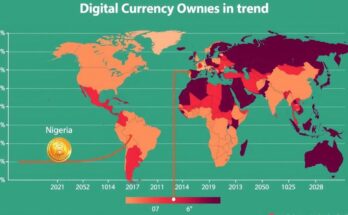Peru’s mining sector is at a critical juncture, with debates over the Registro Integral de Formalización Minera (Reinfo) highlighting its perceived failures in curbing illegal mining and violence. While intended to assist small-scale miners, Reinfo has been criticized for facilitating illegal activities. Concerns regarding ineffective enforcement, legislative challenges, and the human cost of violence linked to illegal mining underscore the urgent need for reform in the face of profound environmental and economic repercussions.
Peru’s mining industry is currently confronting a significant crisis as ongoing discussions regarding the Registro Integral de Formalización Minera (Reinfo) reveal fundamental issues in managing illegal gold mining and associated violence. Initially intended to integrate informal miners into the formal economy, Reinfo has come under intense scrutiny for possibly enabling illicit mining laundering activities, exacerbating the problems it was designed to mitigate. Established in 2012, the Reinfo initiative aimed to aid small-scale and artisanal miners. However, its numerous extensions have led to widespread criticism about its efficacy, with investigations from 2021 to 2023 indicating that over 5,800 entities registered under this framework failed to submit required gold production reports, exposing severe enforcement weaknesses and rendering the program largely ineffective against rampant illegal mining.
The legislative discussions surrounding Reinfo have reignited in Congress amid concerns of a legislative deadlock. While a proposal to extend the program until June 2025 has gained traction, dissenters warn this could bolster criminal enterprises operating within illegal mining networks. Congresswoman Diana Gonzales has criticized the initiative as “a gateway for criminal activities,” pointing to its insufficient oversight and the extensive legal exemptions available to registered miners. Adding complexity to the situation is the role of Eduardo Salhuana, a lawmaker allegedly associated with informal mining interests, whose support for pro-mining legislation raises alarms about the integrity of Peru’s mining policy development.
Illegal mining remains a serious menace in Peru, operating largely under the aegis of organized crime and generating an estimated annual income surpassing $8.2 billion—outstripping even narcotics trafficking. In the important mining area of Madre de Dios, discrepancies between official and actual gold production figures have come to light, revealing that while government reports indicated 1.4 tonnes of gold production in 2023, independent assessments suggested a staggering 8.5 tonnes. The environmental ramifications are dire, with substantial forest degradation and the introduction of mercury pollution threatening both ecosystems and human health, particularly in communities where up to 30% of gold is extracted illegally.
The tragic human implications of this illegal mining crisis cannot be understated. The murder of park ranger Victorio Dariquebe Gerewa, who was slain by illegal miners while protecting his community, underscores the peril faced by indigenous defenders against these criminal enterprises. His passing has stoked outrage among indigenous groups and highlights the threats posed by illegal mining and drug trafficking in remote regions of Peru. Concurrently, in areas like Pataz, violence continues to escalate, evidenced by multiple attacks on local mining facilities, indicating that organized crime is increasingly emboldened. The national government declared a state of emergency in Trujillo and Pataz in response to these violent trends, although operational effectiveness remains hampered by financial constraints and limited legal frameworks.
Amidst these challenges, widespread protests have emerged as small-scale miners assert their demands for a two-year extension of the Reinfo program. The National Federation of Small-Scale and Artisanal Miners (Fenamarpe) is spearheading these protests, asserting the need for further time to navigate the formalization process. These protests reflect the delicate balancing act the Peruvian government must undertake in regulating mining while considering the livelihoods tied to artisanal mining and addressing the dire environmental impact of illegal practices.
In conclusion, the situation surrounding Peru’s mining policies is intricate and fraught with tension. While initiatives like Reinfo are crucial for incorporating artisanal miners into the formal economy, they must be paired with stringent oversight to prevent illegal mining activities from proliferating. The government’s failure to implement effective reforms could lead to irrevocable environmental damage and solidify illegal mining networks, undermining its efforts to establish a coherent regulatory framework. A decisive approach is essential to reconcile the competing interests of economic development, environmental protection, and the welfare of vulnerable communities in Peru.
Peru is experiencing a tumultuous phase in its mining sector, especially in light of legislative measures aimed at formalizing small-scale mining operations through the Registro Integral de Formalización Minera (Reinfo). Launched to assist miners in transitioning from informal to formal status, Reinfo has faced significant backlash regarding its effectiveness and enforcement. This backdrop is exacerbated by an ongoing rise in illegal mining activities, which are not only financially lucrative but also devastating to the environment and public health. The interconnections between political dynamics, illegal mining, and violence complicate the landscape, raising urgent questions about governance and the welfare of affected communities.
In summary, the challenges facing Peru’s mining sector are multifaceted and underline the need for comprehensive reform. The interplay between illegal mining operations, environmental degradation, and violence necessitates a more vigilant and structured response from the government. Reinfo’s shortcomings reveal the dangers of inadequate oversight, and without significant changes to address the root causes of these issues, Peru risks perpetuating a cycle of illegal mining that threatens both its environment and the well-being of its communities.
Original Source: www.intellinews.com




